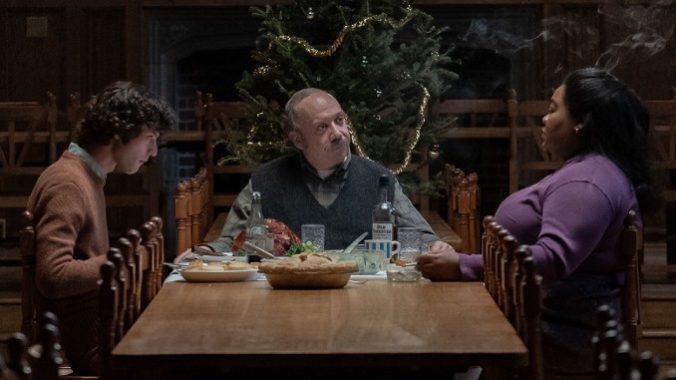Alexander Payne Cozies Up to the Past in the Delightful, Nuanced The Holdovers

Alexander Payne takes us back to school in order to satirize the larger American political landscape in The Holdovers, but his once-acidic tone has undoubtedly taken a shift toward the sincere since newcomer Reese Witherspoon first hit our screens as know-it-all Tracy Flick in Election nearly 25 years ago. Now, with the early 1970s-set holiday drama The Holdovers, his indictment of the American Dream may burn more slowly, but the gut punch Payne packs is no less severe, so long as you aren’t put off by a healthy dose of nostalgia—even the vintage opening credits are wistful. Perhaps The Holdovers is the inverse of Election; in Election, a feud between a star pupil and an optimistic teacher who loves his students wreaks havoc on a school, whereas The Holdovers is about a jaded professor who bonds with the “bad boy” of the school, the positive impact that bond has on both of their lives and the school as a whole.
Stinky, sweaty, disgruntled Paul Hunham (Paul Giamatti with a lazy eye), a hardass Ancient Civilizations professor who makes no attempt to hide how much he despises his “vulgar” students, is put in charge of babysitting the students whose parents don’t want to deal with them over the Christmas holiday break. The headmaster of Barton, the New England all-boys boarding school, chooses Paul for this job not because he thinks Paul will have a favorable effect on the boys, but as punishment for previously failing the son of a wealthy donor. When it comes to especially wealthy students, Paul has a particularly nasty chip on his shoulder, and he wants everyone to know it.
Paul’s mix of disappointment and anger at spending his holiday break babysitting instead of reading mystery novels is reciprocated by the less-than-merry band of Lost Boys placed in his care. “And I thought all the Nazis had left for Argentina,” quips the smartass leader of the gang, Angus Tully (Dominic Sessa), when Paul harshly disciplines the boys for fighting. Angus has been kicked out of more schools than he can count, and touts a less-than-stellar reputation at Barton, despite his solid grades. In fact, Angus has the best grades in Paul’s class, but he wouldn’t want the other boys to know that. For the entire semester, he’s been looking forward to his relaxing winter vacation with his mom, but she’s dumped him onto Paul, in favor of spending some alone time with her new husband.
In a stroke of luck for the boys, one of their fathers arrives in a helicopter to whisk them all away for a skiing trip. The boys’ luck is Angus’ misfortune however: Paul is unable to reach Angus’ mother, and therefore not legally allowed to let him go on the excursion. Angus and Paul are not alone, as they are joined by Mary Lamb (Da’Vine Joy Randolph), the head of the school cafeteria, who recently lost her beloved son Curtis, himself a Barton alum, in the Vietnam war. A grandiose show is made over Curtis’ passing during a schoolwide mass, but the school’s culpability in the death of a young poor Black man is left unmentioned.
If this sounds like the trappings of an “unlikely family of outsiders finds understanding during the holidays” kind of movie, it’s because that’s exactly what The Holdovers is. Neither Payne nor screenwriter David Hemingson are afraid to lean into the romantic notion that three disparate people with vastly different circumstances can briefly come together as a family, especially during Christmastime, for Christ’s sake. All three of the protagonists are hiding deeply held secrets and desires that are slowly revealed over the course of their time together, to the point that they truly come to rely on each other for trustworthy companionship. At first, it never occurs to Paul that maybe he and Angus have more in common than he might expect, that maybe he doesn’t have Angus completely figured out, until Mary points this simple fact out to him.
-

-

-

-

-

-

-

-

-

-

-

-

-

-

-

-

-

-

-

-

-

-

-

-

-

-

-

-

-

-

-

-

-

-

-

-

-

-

-

-








































